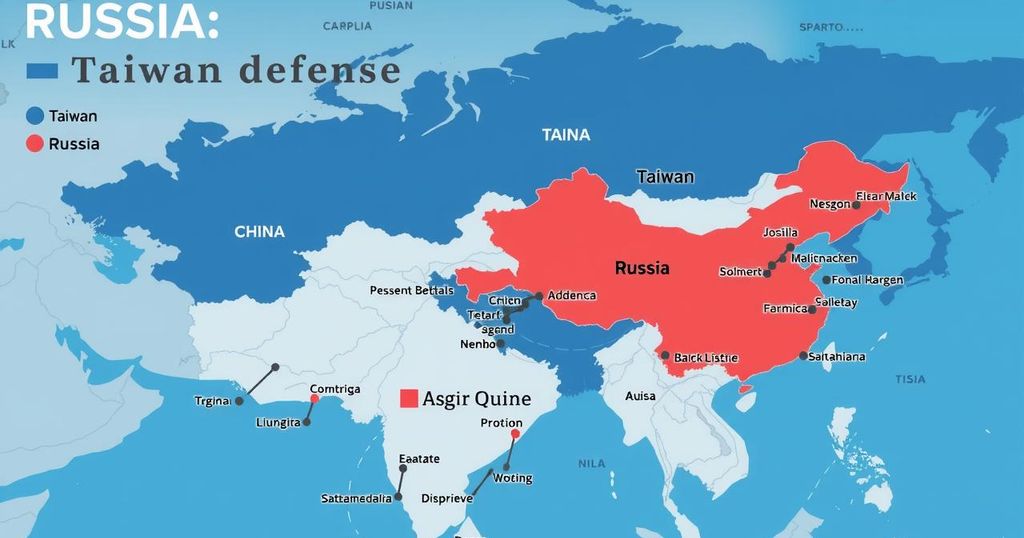Global news
ARMS TRADE, ASIA, BEIJING, CHINA, CONGRESSIONAL, DEFENSE, EUROPE, EUROPE/ASIA, GEOPOLITICS, INDO, INDO - PACIFIC COMMAND, INTERNATIONAL RELATIONS, MARK RUTTE, MEXICO, MILITARY SUPPORT, MOSCOW, NORTH AMERICA, PACIFIC, PLA, PUTIN, RUSSIA, RUSSIA-UKRAINE WAR, TAIWAN, TRUMP, U. S, UKRAINE, US, US INDO - PACIFIC COMMAND, XI
Marcus Li
0 Comments
How Russia Could Complicate U.S. Efforts to Defend Taiwan
- NATO Secretary General Mark Rutte warns about potential Russia-China cooperation regarding Taiwan.
- China has ramped up military pressure on Taiwan, with notable increases in hostile activities.
- Russia’s military capacity for NATO engagement remains weakened due to the Ukraine conflict.
- NATO countries are increasing military budgets and fortifying defenses against potential Russian aggression.
- U.S. military commitments in the Middle East complicate strategies regarding possible conflicts in Taiwan.
Alliance between Beijing and Moscow intensifies global tensions
Growing Tensions: Russia, China, and Taiwan Relations As the alliance between Beijing and Moscow strengthens, the implications for U.S. defense strategies concerning Taiwan become more intricate. With a shared ambition to disrupt the global power dynamics, concerns are mounting about how deeply these two nations would collaborate in the event of a Chinese military operation against Taiwan. NATO Secretary General Mark Rutte recently heightened these concerns, stating that significant cooperation could be forthcoming. Rutte emphasized a distinct possibility: should Xi Jinping decide to invade Taiwan, he would likely notify his Russian counterpart, Vladimir Putin, in Moscow beforehand. According to Rutte, the expectation is that Putin would then stir up tensions in Europe, putting pressure on NATO to divert its focus away from the Indo-Pacific region.
NATO nations strengthen defenses amid rising concerns
U.S. and NATO Prepare for Multi-front Conflicts Rutte’s insight comes in light of escalating military pressures from China on Taiwan. Recently, Admiral Samuel Paparo, the commander of U.S. Indo-Pacific Command, highlighted that this Chinese military pressure has reached alarming levels. Paparo noted a staggering 300 percent increase in hostility directed towards Taiwan within just one year. Meanwhile, the long view perspective on Russia’s capabilities suggests that they are still bogged down in the ongoing conflict in Ukraine, making any potential offensive action against NATO highly unlikely at this juncture. Lt. Gen. Kyrylo Budanov, head of Ukraine’s Defense Intelligence Directorate, stated that while a future Russian military mobilization against NATO is possible, it certainly would not happen now. NATO nations are understandably cautious; many are increasing their defense expenditures and reinforcing their borders, particularly vigilant of Russian aggression near Finland.
Multiple regional conflicts challenge U.S. military capabilities
Implications of Regional Conflicts for U.S. Forces Complicating matters further are the ongoing military engagements of the United States in various regions. The recent military actions in the Middle East, particularly against Iranian nuclear facilities, indicate that the U.S. remains preoccupied with conflicts that may distract from the pressing situation in Asia. Officials express that should an immediate conflict arise in Europe and concurrently in the Indo-Pacific, the logistics of deploying assets to Taiwan in time could become insurmountable. North Korea also looms large in the equation as its unpredictable behavior under Kim Jong Un creates an additional layer of complexity for U.S. defense strategies. The fear is that if a serious threat arises from North Korea, this could force U.S. allies to split their military focus, complicating the defense of Taiwan very significantly.
In summary, the growing partnership between China and Russia presents complex challenges for U.S. defense efforts regarding Taiwan. With increasing military pressure from China and unlikely Russian support due to their current focus on Ukraine, NATO nations are taking precautions by boosting their military readiness. However, the regional dynamics involving North Korea and ongoing U.S. military commitments in the Middle East may hinder an effective defense strategy—should the need arise.




Post Comment